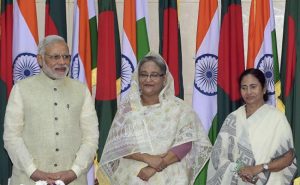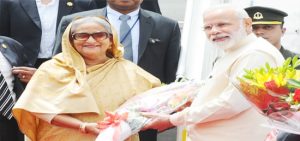 Will the waters of Teesta river unite, or divide India and Bangladesh? This is the overwhelming question for many commentators and the media in the two countries as Bangladesh Prime Minister Sheikh Hasina began her four-day visit to India on April 7.
Will the waters of Teesta river unite, or divide India and Bangladesh? This is the overwhelming question for many commentators and the media in the two countries as Bangladesh Prime Minister Sheikh Hasina began her four-day visit to India on April 7.
Since September 2011, when West Bengal Chief Minister Mamata Banerjee vehemently opposed the Teesta deal and chose to opt out of the then India’s Prime Minister Manmohan Singh’s visit to Dhaka, a solution to the issue has remained elusive. As Ms Banerjee refused to budge from her stand, the Teesta issue appeared to have lost some traction as India and Bangladesh made dramatic strides in their bilateral ties in the last six years in a range of areas including security, land and maritime boundary demarcation, power and road connectivity. However, it returned to spotlight again on the eve of Sheikh Hasina’s visit primarily due two reasons: (1) the mercurial chief minister of West Bengal has agreed to be present in the talks between Prime Minister Narendra Modi and Sheikh Hasina on April 8 and (2) Sheikh Hasina has once again made a strong pitch for the Teesta treaty on the eve of her arrival in Delhi.
Mercurial Mamata
There had been doubts and speculations if Ms Banerjee would join Modi and Hasina in the talks primarily due to her known stand on the Teesta issue and the daily political sabre-rattling between her and the Modi government on the issue of scrapping of high-value currency notes and Bharatiya Janata Party’s alleged saffron agenda across the country. The Hasina government, which faces elections next year, expects India to travel the extra mile to ensure that the Teesta deal is sealed and signed or at least get a concrete assurance from New Delhi during her visit to Delhi. Hasina is already under attack from opposition BNP, which is accusing her of “selling the country’s interests to India” and that her visit would be meaningful without securing the Teesta deal.
Aware of this, the Modi government not only sent a formal invite to Ms Banerjee to attend the talks between the two PMs over lunch at the Hyderabad House in Delhi but deployed External Affairs Minister Sushma Swaraj to ensure Ms Banerjee’s presence. Mrs Swaraj is one of the few BJP leaders who has very good equations with Ms Banerjee and the former dialled her on April 3 and managed to persuade her to join the talks. Not content with this, Modi, in a deft tactical move, is understood to have decided to use the services of President Pranab Mukherjee, who calls Ms Banerjee by her first name, to nudge her on the Teesta issue during a dinner Mr Mukherjee will host for Sheikh Hasina at the Rashtrapati Bhavan on April 9. Doubts about Ms Banerjee attending the two events in Delhi had arisen after she, in a recent interview to a Bengali TV channel, had accused the Indian government of keeping her in the dark about a reported move to ink the Teesta deal in May this year.
However, any optimism on Teesta needs to be tempered by the hard reality that Ms Banerjee had, in the same TV interview, said that friendly relations with Dhaka notwithstanding, the interests of her own state West Bengal take priority. On April 5, she said during an administrative meeting in Bankura district of West Bengal that there is no water in the Teesta. This clearly shows the West Bengal government is not yet fully on board on sharing of Teesta waters with Bangladesh, a senior official of the External Affairs Ministry said. “There is still some degree of doubt that has been expressed by the State government on what will be the implications of such an accord on the people of West Bengal and until that is resolved, this [negotiation on the agreement] remains a challenge. But we have not yet reached a closure on,” said Sripriya Ranganathan, Joint Secretary in charge of Bangladesh and Myanmar in the Ministry.
Asked about the outcome of the meeting between Ms. Banerjee and Ms. Hasina, Ranganathan said “I will sidestep this question for now. In any case, I cannot pre-judge the talks between the leaders.” “The Prime Minister [Narendra Modi] during his visit to Dhaka (in June 2015) conveyed that India is a federal structure and we need to have the full and unstinted support of the state government [while concluding the Teesta treaty] and it is a work in progress.”
Bangla Bonding
A measure of the importance of Teesta deal for Mrs Hasina can be had from the article she wrote in a leading Indian newspaper in which she pitched for it. While expressing the hope that her visit to India would take cooperative relations between Bangladesh and India to a “new height,” she sought to woo Ms Banerjee by using the card of cultural and linguistic affinities her country shares with West Bengal.
Pointing to the shared cultural heritage and common Bangla language between Bangladesh and West Bengal, Sheikh Hasina said there was no reason why there should be any friction between the two countries over the waters of common rivers.
She said “I know resources are scarce but we can share those for the benefit of the people of both countries. We share the same culture and heritage. There are a lot of commonalities (at least with West Bengal). We share our (poets) Lalon, Rabindranath, Kazi Nazrul, Jibanananda; there is similarity in our language, we are nourished by the waters of the Padma, Brahmaputra, Teesta and so on. The Sundarbans is our common pride. We don’t have any strife over it. Then, why should there be any contention over the waters of common rivers?”
 It remains to be seen if Mrs Hasina’s charm offensive has any effect on Ms Banerjee who is known for her hard-nose political sense. With panchayat (village administration bodies) elections in West Bengal just a few months away, will the chief minister take the risk of a deal that she believes will affect water supply from Teesta in northern part of the state? One has to wait till April 9 to know whether the mercurial chief minister has decided to stall the Teesta deal yet again, or defied all speculation to become saviour of this deal, which can move India-Bangladesh relations on another plane.
It remains to be seen if Mrs Hasina’s charm offensive has any effect on Ms Banerjee who is known for her hard-nose political sense. With panchayat (village administration bodies) elections in West Bengal just a few months away, will the chief minister take the risk of a deal that she believes will affect water supply from Teesta in northern part of the state? One has to wait till April 9 to know whether the mercurial chief minister has decided to stall the Teesta deal yet again, or defied all speculation to become saviour of this deal, which can move India-Bangladesh relations on another plane.
Author Profile
- India Writes Network (www.indiawrites.org) is an emerging think tank and a media-publishing company focused on international affairs & the India Story. Centre for Global India Insights is the research arm of India Writes Network. To subscribe to India and the World, write to editor@indiawrites.org. A venture of TGII Media Private Limited, a leading media, publishing and consultancy company, IWN has carved a niche for balanced and exhaustive reporting and analysis of international affairs. Eminent personalities, politicians, diplomats, authors, strategy gurus and news-makers have contributed to India Writes Network, as also “India and the World,” a magazine focused on global affairs.
Latest entries
 DiplomacyJanuary 5, 2026India walks diplomatic tightrope over US operation in Venezuela
DiplomacyJanuary 5, 2026India walks diplomatic tightrope over US operation in Venezuela India and the WorldNovember 26, 2025G20@20: Africa’s Moment – The Once and Future World Order
India and the WorldNovember 26, 2025G20@20: Africa’s Moment – The Once and Future World Order DiplomacyOctober 4, 2025UNGA Resolution 2758 Must Not Be Distorted, One-China Principle Brooks No Challenge
DiplomacyOctober 4, 2025UNGA Resolution 2758 Must Not Be Distorted, One-China Principle Brooks No Challenge India and the WorldJuly 26, 2025MPs, diplomats laud Operation Sindoor, call for national unity to combat Pakistan-sponsored terror
India and the WorldJuly 26, 2025MPs, diplomats laud Operation Sindoor, call for national unity to combat Pakistan-sponsored terror







